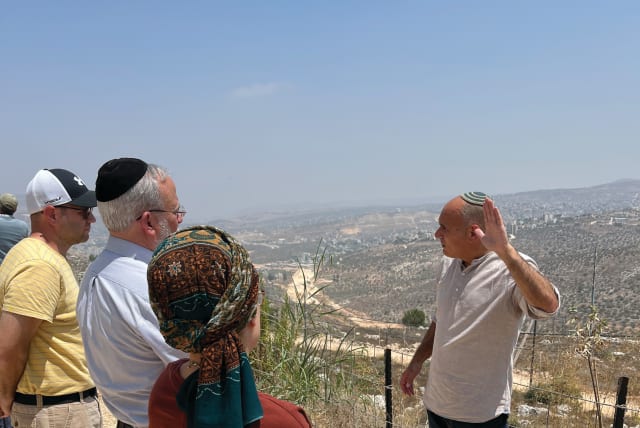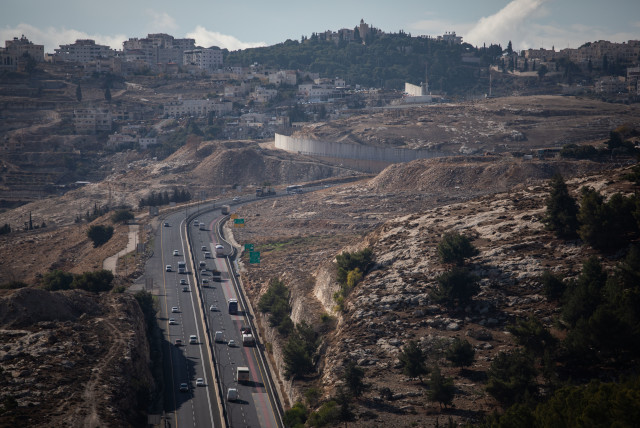There are no anti-Arab 'apartheid' roads in the West Bank - opinion

Arabs of Judea and Samaria can use all the roads, including those in Area C, but for Jewish Israelis, entry into Area A constitutes a criminal offense.
There are those who falsely claim that travel in Israel is restricted for the Arabs of Judea and Samaria. But that is not the reality.
Judea and Samaria contains close to 2,500 km. of roads for intercity traffic – and travel between communities – of which 1,600 km. are located in Area C.
Arabs of Judea and Samaria can use all the roads, including those in Area C, apart from those that provide access inside Jewish communities and security zones controlled by the IDF, which comprises only 3% of the area.
Adversely, Israelis are permitted to drive in Area C, but entry into Area A constitutes a criminal offense. It therefore follows that almost 35% of the region’s roads are off limits for Jewish Israeli (meaning Jewish) traffic.
The ban on Israeli traffic can be construed as racist, seeing that an equal ban is not enforced when it comes to Israeli Arab citizens. In fact, their entry is encouraged by state authorities in order to strengthen the economy of the cities under Palestinian Authority rule.
To use a personal example: Route 57 extends from my community of Avnei Hefetz to Elon Moreh. It passes through the city of Shechem and skirts by Joseph’s Tomb. For security reasons, travel on this road is prohibited for Jews, and I have to take a long detour to Elon Moreh via Route 60, which adds a lot of travel time until I reach my destination.
The same applies to residents of Gush Dolev and Talmonim, in the Mateh Binyamin district, who need to get to the Binyamin Regional Council offices. They have to detour through Jerusalem instead of traveling a direct route past the outskirts of Ramallah and through Beit El.
Bottom line: Travel restrictions apply primarily to the Jewish-Israeli demographic.
Building up roads in the West Bank
For decades, development in the region has occurred without any strategic planning for the future, but rather as a temporary or local need to solve existing problems, such as the construction of bypass roads during the Oslo Accords.
Recent years have shown efforts by the Yesha Council to change this approach, and we have pressed the government to move forward with a master plan for transportation.
According to data accumulated in 2019, of the total 290 km. road expansion and paving that has commenced throughout Israel, only 8.9% of those are located in Judea and Samaria, notwithstanding that approximately a quarter of the country’s roads can be found in this region. In addition, projects to improve existing roads are insufficient, and receive only 6% of the national investment.
Judea and Samaria is home to 20% of Israel’s population who travel on almost a quarter of the country’s intercity roads and have been involved in 20% of Israel’s fatal accidents – yet only 4% of the state’s five-year budget between 2017-2021 was invested in roads in this region.
Following much effort, the Transportation Ministry and other entities completed the preparations for a transportation master plan two years ago. This plan peers decades into the future, focusing on the population increase, travel habits, and transportation consumption.
Meanwhile, other projects have been underway, some of which have been completed or are in advanced stages, such as the Lev Yehudah Road – a high-speed artery between the Gush Etzion Junction and Hebron – and the Lev Hashomron Road (the Huwara bypass), which will become a highway stretching between the Tapuah Junction towards Shechem, the Qalandiya interchange, and others.
Contrary to false claims, these roads serve all Jewish and Arab residents of Judea and Samaria. The development of this vital infrastructure improves the quality of life for all, prevents road accidents – and fatalities – and saves precious time and unnecessary fuel expenses.
This is all part of the economic peace efforts that are slowly taking shape in our area, and constitute a practical regional model for the Abraham Accords. The development of public infrastructure and economic reinforcement of the region is the key to its future.
The writer is the founder and a board member of American Friends of Judea and Samaria, (afjs.org), a nonprofit educational organization dedicated to increasing knowledge and sharing the truth about the Israeli communities of Judea, Samaria, and the Jordan Valley. He is also a former CEO of the Yesha Council.
Jerusalem Post Store
`; document.getElementById("linkPremium").innerHTML = cont; var divWithLink = document.getElementById("premium-link"); if (divWithLink !== null && divWithLink !== 'undefined') { divWithLink.style.border = "solid 1px #cb0f3e"; divWithLink.style.textAlign = "center"; divWithLink.style.marginBottom = "15px"; divWithLink.style.marginTop = "15px"; divWithLink.style.width = "100%"; divWithLink.style.backgroundColor = "#122952"; divWithLink.style.color = "#ffffff"; divWithLink.style.lineHeight = "1.5"; } } (function (v, i) { });

